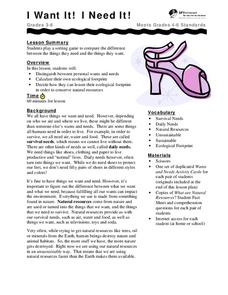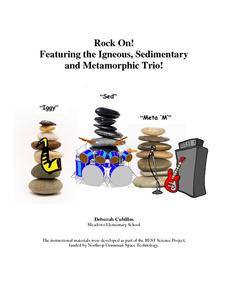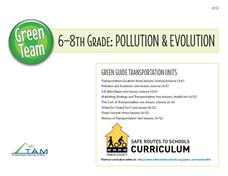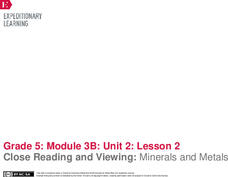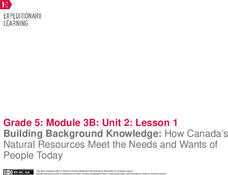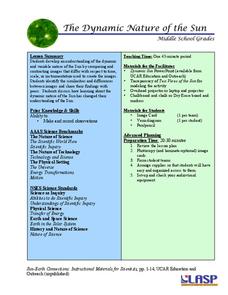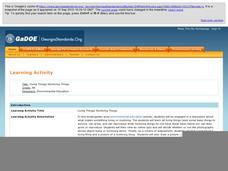Cal Recycle
Conserving Natural Resources
Trying to plan an engaging elementary science unit on natural resources? Conserve your energy! This five-part series of lessons and hands-on activities has exactly what you need to teach young scholars about the importance of conservation.
American Chemical Society
Natural Resources and Synthetic Materials
All synthetic materials began as natural materials. An engaging lesson begins with a hands-on activity and an example of the type of research that scholars perform independently. Then pupils receive a topic and begin researching the...
National Science Teachers Association
Safety in the Science Classroom, Laboratory, and Field Sites
The best learning environment is a safe learning environment. Remind young scientists about safety rules and regulations in the science lab, the classroom, and the field.
EngageNY
End of Unit Assessment Part II: Science Talk
Scholars complete Part 2 of their end of unit assessment by having a science talk. Pupils pair up to answer questions about what makes a natural disaster. As one learner talks, the other records what is said. They then trade places.
City and County of San Francisco
I Want It! I Need It!
Discuss wants and needs with your elementary ecologists and get them to consider what would happen to our natural resources if we all got everything that we want. Learners play a card sorting game and take an ecological footprint quiz on...
Broward County Public Schools
Force and Motion
Get the ball rolling with this upper-elementary science unit on forces and motion. Offering over three weeks of physical science lessons, this resource is a great way to engage the class in learning about simple machines, friction, the...
Fluence Learning
Writing About Literature: Nature in the Writings of John Muir and Emily Dickinson
As an assessment of their skill in crafting a compare and contrast essay, class members read and compare the portrayals of nature in excerpts from naturalist John Muir's My First Summer in the Sierra and from poet Emily Dickinson's "The...
Chicago Botanic Garden
Greenhouse Gas Emissions — Natural and Human Causes
What impact do humans have on greenhouse gas emissions? What are the natural causes of these gasses? Thanks to the carbon cycle, carbon dioxide eats away at the earth's atmosphere with the intensified help of humans. Young scientists...
Curated OER
Rock On! Featuring the Igneous, Sedimentary and Metamorphic Trio!
Get your classroom rocking with this four-lesson earth science unit. Through a series of shared reading activities and hands-on investigations, young geologists learn about the three types of rocks and the unique properties of each.
Curated OER
Hazards: Fourth Grade Lesson Plans and Activities
Learn about damage associated with earthquakes and materials that best withstand a quake. A lab engages class members in the experimental design and construction of sturdy structures that can endure various earthquake intensities. Groups...
Curated OER
Hazards: Sixth Grade Lesson Plans and Activities
Sixth graders explore the damage associated with an earthquake by designing a structure that can withstand earthquake intensities on a shaker board. They then view tips for preparing for an earthquake, and what to do after an earthquake...
Curated OER
Hazards: Third Grade Lesson Plans and Activities
Learners discover hazards related to volcanoes and predict the effects these hazards have on people and land. As blossoming geologists explore various volcanic eruptions, including the hazards associated with them, they create their own...
Safe Routes to School
Pollution & Evolution
Bring together a study of two major scientific topics with a lesson on the relationship between pollution and evolution. With the help of a PowerPoint presentation, hands-on activity. and class demonstration young scientists learn how...
Dick Blick Art Materials
Natural Twig Journals
Connect science, art, and language arts with a nature-themed bookmaking project. Kids craft book covers, cut paper for pages, and learn how to bind their creations.
EngageNY
Close Reading and Viewing: Minerals and Metals
How easy is it to live off the land? Scholars read Minerals and Metals in Your Life and discuss how Canada's natural resources meet the needs of the people. Pupils watch a brief video and discuss the gist of the text and video. They then...
NOAA
What Killed the Seeds?
Can a coral cure cancer? Take seventh and eighth grade science sleuths to the underwater drugstore for an investigation into emerging pharmaceutical research. The fifth installment in a series of six has classmates research the wealth of...
Nevada Outdoor School
Let It Snow! Let It Melt!
Winter weather offers a great opportunity to teach young scientists about the states of matter. This activity-based lesson includes a range of learning experiences, from experimenting with the rate at which ice melts to singing a song...
Core Knowledge Foundation
Rocks & Minerals
Take young geologists on an exploration of the rock cycle with this six-lesson earth science unit on rocks and minerals. Through a series of discussions, demonstrations, and hands-on investigations your class will learn about the...
May Media Group
Treatment Plants
Young scientists explore nature's water treatment plants in this simple science demonstration. By placing a stalk of celery in a cup of water mixed with food coloring, children are able to observe how plants absorb nutrients and...
Voyage Solar System
Round and Round We Go — Exploring Orbits in the Solar System
Math and science come together in this cross-curricular astronomy lesson plan on planetary motion. Starting off with a hands-on activity that engages the class in exploring the geometry of circles and ellipses, this lesson plan then...
Core Knowledge Foundation
A Time for All Seasons - Spring
Celebrate the arrival of spring with this fun primary grade science unit. Engaging young scientists with a variety of hands-on activities and inquiry-based investigations, these lessons are a great way to teach children about seasonal...
EngageNY
Building Background Knowledge: How Canada’s Natural Resources Meet the Needs and Wants of People Today
Learners follow along as the teacher reads Products of Mining in Canada: From Batteries to Vehicles aloud. They then discuss the meaning of key terms and determine the gist of the text. Pupils do a second read and complete a graphic...
PHET
The Dynamic Nature of the Sun
In this second lesson of the series, pupils learn to observe similarities and differences in photos of the sun and record them in a Venn diagram. Then, small groups practice the same skill on unique images before presenting their...
Georgia Department of Education
Living Things/ Nonliving Things
How can you tell if something is living or nonliving? Introduce a set of criteria which can be used to determine which things are alive and which are not. The class discusses the basic needs of all living organisms, checks out an...






